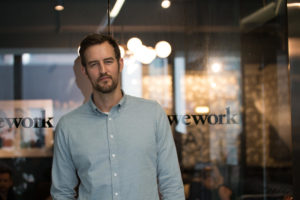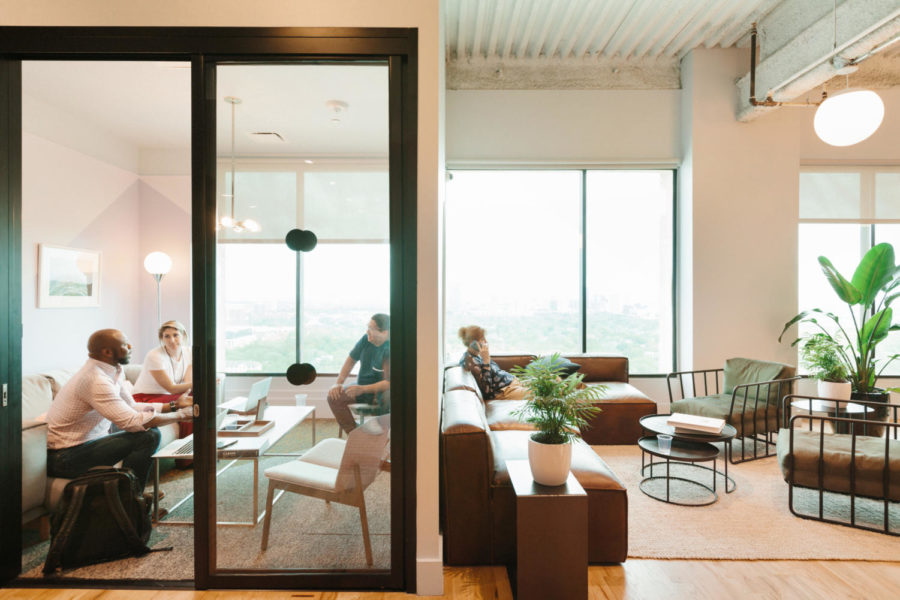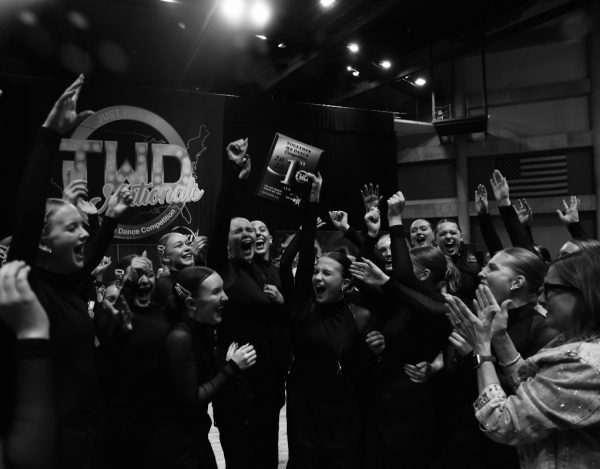WeWork: The American start-up epitomized
The company that might take over the world
A WeWork conference room in Houston, TX
We’re innovators. We’re turning the market upside down. We’re going to change the way you think about the industry. And we’re definitely not overvalued.
That probably sounds like a vague description of every startup in America. But the We Company, formally known as WeWork, promises to fulfill every stereotypical startup promise and live up to its $45 billion valuation along the way. The goal? A creepy-ish future where the way white-collar workers do their jobs has been completely transformed.
When the We Company started off as just WeWork, the concept was simple: lease buildings in urban areas and sublease them to freelancers, other startups and large tech companies. WeWork spaces offer the amenities commonly associated with Silicon Valley companies, like free food, beer, onsite gyms and yoga studios. Most of the time, individuals don’t rent an office; they rent the right to a certain amount of time at a desk. But, as the company is happy to tell you, WeWork doesn’t just rent a trendy place to work; it offers the opportunity to socialize with other fresh, up-and-coming minds. The company is selling a space where you can immerse yourself in a world of innovation and new ideas.

WeWork spaces emphasize communal areas where people can share what they’re working on
WeWork spaces are designed to maximize productivity. And, like all great tech companies, they hope to accomplish this through the collection of data. Chief Development Officer Dave Fano told Business Insider that WeWork uses data collected from sensors in its offices to maximize occupancy, temperature and sound levels.
“WeWork’s bet is that because it is amassing so much office space and studying how thousands of different businesses use it, it can position itself as the company with the most valuable firsthand knowledge about how jobs best get done,” wrote Jessi Hempel for WIRED.
The goal of maximum productivity doesn’t end there, though. The We Company vision is a future where people love being at work, and where the place they live allows them to keep working without any outside distractions. In April of 2016, WeWork announced WeLive, co-living spaces designed to keep the wholesome WeWork community vibes rolling after the work day is over.
“WeLive challenges conventional apartment living by creating homes within a community that are designed to bring people together,” said WeWork in a blog post.
Communal spaces allow millennial workers to continue networking and discuss brand strategy while they’re off the clock.

WeWork Chief Culture Officer Miguel McKelvey
“Our aspiration is to be a holistic support system or lifestyle solution for people who are interested in being open and connected,” said WeLive CCO Miguel McKelvey to GQ.
That “lifestyle solution” allows workers to never stop thinking about how their big ideas are going to change the world. As one resident told the New York Times: “You just roll out of bed, go down the elevator and get to work.”
So, is WeWork crafting a dystopian capitalist society where workers are never off the clock, one cucumber infused water station at a time? The answer is probably not. It’s pretty easy to hate on WeWork, and plenty of naysayers are willing to point out some flaws with the company. Criticism ranges from jabs at its use of “artificial intelligence” to determine the obvious to declarations of the We Company’s worst nightmare: that it’s just another real estate company. Some analysts have even gone so far as to say that WeWork is the most overvalued company in the world. Does it help that in Jan. it was discovered that the CEO was renting buildings to his own company? Probably not.
The founders of the We Company continue to believe in their vision as they plan to expand around the world, including the opening of spaces in South Africa. Sioux Falls residents might be interested to know that they can rent a nearby WeWork in upper Minneapolis. It’s hard to tell if all of the hate for the company is warranted. Maybe someday we’ll live in a society where the places we work, buy our groceries, sleep and send our kids to school are run by the We Company.

Slater Dixon is a senior and this is his second year on the Statesman staff. When he is not exposing the seedy, corrupt underbelly of LHS through hard-hitting...







